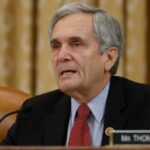
I gotta say Robert F. Kennedy, Jr., caught my attention.
I concurred with his opposition to the COVID vaccine and appreciated the pandemic research through his Children’s Defense Fund, whose newsletter I continue to read.
Not that I would ever vote for him, but more about Kennedy became apparent when he declared himself a 2024 presidential candidate.
Despite the wisdom of his vaccine opposition, Robert Kennedy is full of tired, old leftists beliefs.
And some newer ones — such as advocating phasing out gasoline cars for electric ones.
Trending:
He staked out those positions in various media appearances, according to Fox News contributor Joe Concha. And based upon a 2003 speech, he’s held similar beliefs for a long time.
In an interview last year, Kennedy said the most important thing for the nation “more important than anything else, is to get off of foreign oil, whatever it takes. And I think if we had true markets — We spend $5.2 trillion a year on subsidies to the carbon industry, and that doesn’t include the $8 trillion that we spend on wars protecting essentially oil pipelines.”
Basically, Kennedy said all oil costs for petroleum — including military defense — should be folded into the retail cost of gasoline.
“If those companies were forced to internalize those costs, gasoline would cost its true price, which is about $22 a gallon, and we would be figuring out, using American initiative and our industrial genius, other ways to get around,” Kennedy said.
Is RFK Jr. a radical wolf in moderate sheep’s clothing?
Yes: 91% (10 Votes)
No: 9% (1 Votes)
Twenty-two dollars a gallon? Average U.S. gas price Tuesday was $3.52 per gallon, and Kennedy wants to multiply that by more than sixfold?
In a 2016 speech at the University of California, Berkeley, Kennedy toned it down a bit, calling for $12 per gallon. But in that presentation, he called for the price to reflect the effect of petroleum use on local populations, including their healthcare costs and results of crop damage and acid rain.
It wouldn’t be about economics. No, according to Kennedy, at $12 per gallon, “we’d be sending correct signals to the marketplace.”
So, from those signals, what would the marketplace need to adopt as an alternative?
Why, electric vehicles, of course.
Kennedy told the audience at Berkeley that the federal government should develop an “ecosystem” that pushes efficient technologies and that “punishes” — his word, according to Fox’s Concha — what Kennedy terms “the inefficiencies of oil and coal.”
In a 2013 article for Huff Post, Kennedy said a $12 per gallon gas costs would mean “most Americans would be running to buy electric cars.”
He described those electric cars as “cheap, fast, and efficient.”
Meanwhile, consumers on the ground are wrestling with electric cars that cost too much, have greatly reduced resale value, have problems being charged, and even explode into unquenchable fires from time to time.
And where would all that electricity to power those cars come from?
Domestic electricity demand increased by about 5 percent from around 2012 to 2022, but it is expected to be up 18 percent by 2030 and 38 percent by 2035, according to CNBC.
While there’s been increased residential electric use for things like stoves and space heaters, most growth in power demand is expected to be in transportation, according to a study by Princeton University, CNBC reported.
But that demand — especially from decarbonized sources — requires massive amounts of renewable energy, according to Rob Gramlich, head of an electrical transmission policy group.
And its more than wind and solar generation — the national electric grid needs more high-voltage long-distance transmission lines, more local distribution to houses, and things like inverters for home battery systems.
“I think right now people have an overly simplistic view of what electrification of transportation means,” said Aram Shumavon, CEO of Kevala, a company that analyzes the electrical grid.
“If done right, it will be phenomenal,” he said. “If mismanaged, there are going to be a lot of upset people, and that is a real risk. That’s a risk for regulators. That’s a risk for politicians, and that’s a risk for utilities.”
Electric cars or no, what happens if gasoline goes up even a fraction of what Kennedy wants?
While more than 12 years old, predictions by Kiplingers at that time were based on a gas price increase to $5 per gallon.
In place even if only for a few months, the price hike could suspend economic growth, according to Kiplingers.
Traditionally, when gas prices spike, demand for commuter service goes up. Of course, elite policy-makers like that, but practicalities intrude — could current capacity handle it and who wants to risk their life riding increasingly unsafe New York City subway trains?
Also, since so much transit is by bus, how will bus systems handle increased diesel fuel costs?
Another issue is higher gas prices mean less driving and less gasoline purchases, which means less gas tax for road maintenance, according to Kiplingers.
So the lost revenue may be made up by higher car licensing fees or establishment of toll roads
Those were predictions from more than a decade ago.
Other predictions were done in 2008 by Retail Wire regarding gas going to $10 per gallon.
Those forecasts envisioned grounded aircraft, truckers out of business, and closed businesses.
There’d be more work-from-home, drastically increased food prices, vegetable gardens, less eating at restaurants, fewer purchases of clothing, and increased use of solar and nuclear power.
Except for a push for more nuclear power, the 2008 Retail Wire predictions have not required $10 gas, but many are coming true, seemingly driven by the 2020 pandemic and policies of the Biden administration.
There is a problem in that Robert F. Kennedy is not an outlier in his desire to get people to make radical lifestyle changes.
He reflects positions taken by many on the left, including key players in the Democratic Party.
Some wonder if Kennedy, as an independent, will play the role of spoiler in the 2024 election by siphoning voters from the dominant parties.
Democrats rejected him. That was perhaps unwise, since except for opposing draconian health care, he aligns with many of their values.
But, of course, if you ask some Democrats — Bernie Sanders supporters, for instance — or even Trump supporters dealing with lawfare, efforts by Democrats are not focused on an election.
It’s about selection, some say, and it’s about who puppetmasters running the show really want to select.
Given how Kennedy’s radical position on energy aligns with Democrats’ wishes, I’d say that’s an area in which Biden is the one being threatened by him.







